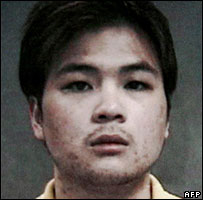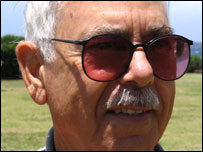
By Phil Mercer
BBC News, Sydney
Time is running out for 25-year-old Australian drug trafficker Nguyen Tuong Van, who is due to be executed at Singapore's Changi prison on Friday.
His death sentence has sparked widespread criticism in Australia.
The Canberra government has repeatedly pleaded for clemency, as have lawyers, trade unions and church groups.
But Singapore remains unmoved, and insists the hanging will go ahead as planned.
"People have been praying for a change of heart," said Father Peter Norden, a friend of Kim Nguyen, the condemned man's mother.
"They want the Singapore government to change its heart from one of stone to a heart of flesh, as well as compassion and reason," he told the BBC.
Father Norden said Nguyen should be spared: "We believe this young man has committed a serious crime deserving of punishment, but not the loss of his life."
Nguyen was arrested carrying almost 400 grams (14 ounces) of heroin at Singapore's Changi airport in late 2002.
He said he was trying to smuggle the drugs from Cambodia to Australia to pay off his twin brother's debts.
Hardline approach
The Australian government believes Nguyen should not face the gallows because he has no previous criminal convictions. It has also argued that he could help investigations into drug syndicates if allowed to live.
But in a letter to his Australian counterpart, the Speaker of the Singapore Parliament, Abdullah Tarmugi, said there was no room for compromise.
"We have an obligation to protect the lives of those who could be ruined by the drugs Nguyen was carrying," he wrote. "He knew what he was doing and the consequences of his actions."No-one has the right to take the life of someone else
John Karousos, Sydney retiree
According to Amnesty International, about 420 people have been hanged in Singapore since 1991, mostly for drugs offences.
If these figures are correct, they would give the prosperous city-state of 4.2 million people the highest execution rate in the world, relative to its population.
At the weekend Australian Prime Minister John Howard made his fifth personal plea to the Singaporean leadership, during the Commonwealth Heads of Government Meeting in Malta.
Mr Howard warned that Singapore should prepare for "lingering resentment" in Australia if the execution went ahead.
He has, however, rejected calls for boycotts of Singaporean companies, as well as trade and military sanctions with one of Australia's closest Asian allies.
"I believe John Howard has done as much as he could do," said Gerard Henderson, from the conservative think-tank The Sydney Institute.
"Listening to talk-back radio, there are some people who think that heroin smugglers deserve the death penalty, but I believe that the majority of Australians hold a different view," Mr Henderson told the BBC News website.
"They will be approaching Friday's deadline with a sense of dread," he added.
Little hope
Nguyen was born in a refugee camp in Thailand in 1980, after his mother fled from Vietnam. The family eventually settled in Melbourne.
Several last-ditch efforts to save him have been suggested, including taking Singapore to the International Court of Justice or arranging a prisoner swap, but legal experts have said none are likely to succeed.
Simon Rice, a lecturer at Macquarie University in Sydney, said that Singapore was not a signatory to international human rights covenants, and there was little hope the 25-year-old drug trafficker would be saved.
"[Nguyen's] execution is a seriously tragic reminder of how far short we are of a global commitment to human rights," Mr Rice told the BBC.
Some church leaders have called on Australians to observe a minute's silence for Nguyen on Friday, but overall opinion remains mixed.
"No-one has the right to take the life of someone else," John Karousos, a 66-year-old retiree in Sydney, told the BBC. "It doesn't matter what he's done or his mistakes. The death penalty is unacceptable."
"I have a small hope that it will be stopped at the last moment," he added optimistically.
But Gilly Parminter, a 40-year-old mother, was less sympathetic.
"Personally I think if you go into a country you have to abide by their laws, and you have to live with the consequences."
"It does seem harsh but they [the Singaporeans] can't change their minds at this late stage because it will undermine their system," she said.
The last Australian to be executed overseas was Michael McAuliffe.
The barman from Sydney was hanged in Malaysia in June 1993, after serving eight years in prison for heroin trafficking.
In 1986 two Australian citizens, Kevin Barlow and Brian Chambers, were also hanged in Malaysia after being convicted of drug smuggling.
There appears to be little hope that Nguyen Tuong Van will avoid a similar fate in Singapore this Friday.
Story from BBC NEWS:
Published: 2005/11/29 00:52:00 GMT

3 comments:
I am a Singaporean who is currently reading law in the United Kingdom. When I learnt about this, I shared it with my hallmates, most of whom are British nationals. To my surprise, most of them had little sympathy for him. The UK is big on human rights with its Human Rights Act and it was heavily involved in the drafting of the European Convention of Human Rights. Drug usage here is common to say the least, and even then, there was no sympathy shown towards a trafficker. Perhaps it is about time people move on and stop harping on the issue. We all know nothing is going to stop the hanging from happening.
Singapore is a small island nation. If there was a relaxed drug policy in the country, it could lead to innumerable social problems. We cannot afford to be undermined by people who flout our laws openly. Michael Fay got caning for vandalism. We didn't stand down from the Americans. Flor Contemplacion got the death sentence for murder. Numerous other Singaporeans have been hung for murder and trafficking. If we are not above our own law, what makes you think you are?
To provide a more balanced viewpoint on your entry:
Wednesday November 30, 12:03 PM
Australia divided over drug runner's execution
By Michael Perry
SYDNEY, Nov 30 (Reuters) - The looming execution of a young Australian drug smuggler in Singapore on Friday has seemingly polarised Australians, many of whom still support capital punishment.
Those pleading for clemency for 25-year-old Nguyen Tuong Van planned to hold a mass and prayer vigil in Sydney's St Mary's Catholic Cathedral on Wednesday night.
"Two wrongs don't make a right. Taking a human life is not a way of solving a problem," the chancellor of the Sydney Archdiocese, Father John Usher, told reporters.
Vigils organised by Catholic and Anglican Cathedrals were also due to be held in Melbourne, Perth and Adelaide.
For days people have been streaming into the local church in Melbourne, Nguyen's hometown, to pray for him. Singapore convicted Nguyen of smuggling 400 grams (0.9 lb) of heroin from Cambodia through Singapore's Changi airport in December 2002.
The powerful Australian Transport Workers Union, which represents airport refuellers and baggage handlers, is threatening to boycott Singapore Airlines if the execution is not cancelled.
A petition for clemency with more than 50,000 signatures was to be presented to the Singaporean High Commission on Wednesday in Canberra, where a 3,000-candle night vigil was planned.
"This vigil is both a solemn way of marking the lead-up to Mr Nguyen's planned execution, as well as a symbol of Australia's hope that even yet, his life may be spared," said Bruce Baird, government MP and chairman of Amnesty's parliamentary group.
Australia's Greens party has called for a minute's silence at 9.00 a.m. Sydney time on Friday, (2200 GMT Thursday), the time when Nguyen is to go to the gallows in Changi Prison.
The Australian Senate passed a motion on Tuesday night opposing state executions. Greens Senator Bob Brown said: "We oppose it because it is inhumane. It is barbaric and it has long been expunged from the Australian way of life".
But while Australia outlawed the death penalty decades ago, opinion polls show many people still support capital punishment.
"Friday is the time to remember heroin's victims" read the headline of a letter published in the Sydney Morning Herald newspaper on Tuesday.
"My heart goes out to Nguyen's parents ... But get real Australia. This man, like all drug dealers, was prepared to trade the lives and future of a thousand of our children for a few miserable dollars," G. Ward wrote in a letter.
A cartoon in Sydney's Daily Telegraph on Wednesday depicted a heroin addict, on the street in front of scores of needles, saying "What a shame he's being executed".
The Telegraph has covered the Nguyen story extensively but it has consistently made the point that Nguyen is a drug smuggler.
"The suggestion that the nation should observe a minute's silence is both morbid and offensive," the Daily Telegraph said in an editorial on Wednesday.
South Australian state premier Mike Rann said a minute's silence would be offensive to war veterans. "People know what the laws are (in Singapore) and they take the risks, they choose to play a form of Russian roulette," Rann said.
The Australian government has made repeated appeals for clemency, with Prime Minister John Howard talking to his Singaporean counterpart five times. It says there is no further legal action that can be taken to save Nguyen.
Opinion polls have shown Australians do not support boycotts against Singapore to protest over Nguyen's execution or possible government court action to fight for his life.
"This is a terrible and sad thing that is about to happen on Friday morning," said Foreign Minister Alexander Downer.
"I think the general mood of the Australian public is that poor old Van Nguyen did something terribly wrong, but we're very sorry that it's going to end with him being hanged."
"
OK, so we have the Singapore government being consistent - with the exception of allowing his mother to hold his hand for a while if reports are true.
Even if 26,000 doses are an exagerration, what wouldn't be? 2,600 doses? How many does it take the average heroin addict before he overdoses? How many unnamed, young Australian men and women and teenages would have had their lives destroyed by those 14 ounces of heroin? How many mothers would have lost their child if Nguyen had succeeded in bringing it to the streets of Australia?
He doesn't care about your children, or your husbands or your wives or anyone else. He only cared for his brother's debts. His brother's debts meant more to him than the lives of others. All the lives that those thousands of doses would have killed is worth less than the $38,000 dollars.
Who is heartless now?
Post a Comment